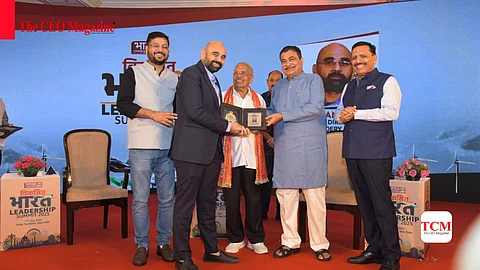
- News
- Women
- Magazine
- IndustryIndustry
- InsightsInsights
- Success Stories
- PublishPublish
- ContactContact
- Media KitMedia Kit

Tapan Kapadia with Nitin Gadkari
While speaking on stage at the Viksit Bharat Leadership Summit 2025, hosted by Bharat 24, Tapan Kapadia, founder and director of HSW Embroidery Machines, talked about how his small idea turned into something big. What started as a basic concept is now helping thousands of people across India, especially women, by giving them a way to earn from home and become financially independent.
HSW began its journey in 2013, but it was in 2017 when the company took a game-changing leap. Mr. Tapan Kapadia introduced compact, single-head embroidery machines designed specifically for home use—an idea that came long before "work-from-home" became a buzzword. His goal? To make women self-reliant by helping them become “Embropreneurs”—a term he coined for embroidery-based entrepreneurs.
Today, more than 5,000 women across India have built home-based businesses using HSW embroidery machines. Many of these women, who had never stepped out of the traditional roles expected of them, are now earning steady incomes, sending their children to English-medium schools, and even creating jobs for others in their community.
Tapan Kapadia's belief in women's economic empowerment is rooted in both statistics and lived experience. “In developed countries, women contribute around 38% to the GDP,” he explained during the interview. “If Indian women get even half the opportunity, we won’t need to wait till 2047—we can become a developed nation by 2035.”
The vision, however, didn’t come without challenges. As Tapan shared, the inspiration to focus on women emerged after an elderly man once thanked him at an expo in Telangana. “He said his grandson could now go to school because of our machine,” Tapan recalled. “That moment changed everything for me. I realized this wasn’t just about business—it was about impact.”
HSW has become more than a machine provider. It’s an ecosystem. Every customer receives free installation, lifetime video call support, and over 1,000 ready-to-use design templates. What truly sets HSW apart is their hands-on approach: they don’t just sell a machine—they stay connected, offer training through YouTube, and support customers at every step.
Tapan studied in Australia, which gave him a better understanding of how global markets work, but it was his on-ground experience in India, especially in door-to-door sales that taught him the value of understanding customer pain points. He mentioned how, in the early days, he personally handled feedback and turned it into actionable improvements. “If a woman in Manipur wants to do embroidery on bamboo baskets, we figure out the tech to make that happen,” he said with pride.
Looking forward, HSW is preparing to take the “Make in India” leap. While they currently import machines, R&D for Indian manufacturing is already underway, with plans to roll out fully India-made machines in the next 6–8 months. HSW also has a presence in countries like Dubai, Sri Lanka, Malaysia, Maldives, Oman, and Qatar, and hopes to expand further with the help of government-supported expos and export opportunities.
Yet, Tapan is clear that more can be done. He highlighted policy gaps that prevent women working from home from accessing MSME registration and government loans due to lack of commercial addresses or GST returns. “The intent is there, the capability is there, but the support system needs to evolve,” he urged.
HSW’s next big goal is to empower 15,000 women in the next three years, and the blueprint is ready. With over 25 outlets across India and strong traction in both the south and north, the company is expanding into states like Punjab and Rajasthan and exploring opportunities in Uttar Pradesh and the Northeast.
The interview closed on a personal note. When asked what kept him going through ups and downs, Tapan smiled and said, “Like in an ICU, if the line goes flat, it means you're gone. Life is the same—it must have highs and lows. Challenges are what teach us.”
Tapan Kapadia isn’t just running a business—he’s building something bigger. With HSW, he’s showing that embroidery machines can do more than just work on fabric. They can help people start small businesses, earn better, and change their lives.
Follow us on Google News
